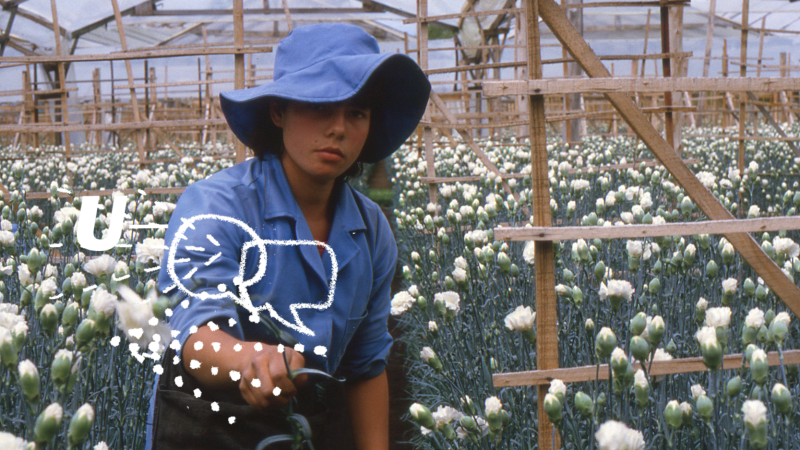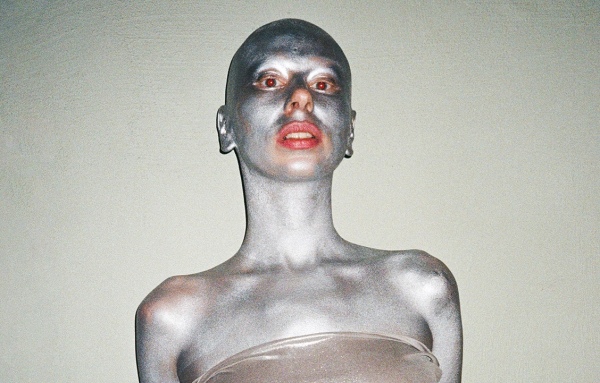Cinema of Others. The View of Women Filmmakers from the Southern Territories
-
This program is an invitation to immerse in “other’s” imaginaries from Southern lands, where the ecology, feminisms and anti-capitalism are visual expressions of everyday life and dreams We weave together shamanic cinema, perspectives of artists in transition or communitarian base filmmaking.
-
This program of films aims to take the spectator into imaging other types of future, feeling the presence of more than human beings and being able to transit through diverse ecologies. The filmmakers use different aesthetics, languages and methods. They come from different places in the Southern Territories: Mexico, Chile, Brazil, Spain and Colombia. Nevertheless they all have in common the need to tell embodied stories, speaking in voices that are ritualistic, feminine, and affective.
-
The stories are immersed in a more-than-human landscape that is not detached or remote, it is both a material and spiritual space in which we and our stories are embedded. This contrasts with common expressions and images of places like Desierto Juarez or the Amazon which are shown either as pristine landscapes without people or exoticized backgrounds for action movies.
-
Day 1 Dream Narratives features five experimental short films involving rituality, speculation and the non-human centre, as well as the discussion with Anaís Córdova-Páez and Krystyna Jędrzejewska-Szmek (in English and Polish)
-
- Coyolxauhqui (Colectivo Los Ingrávidos, 2017). A searing evocation of femicide in rural Mexico. It recasts the dismemberment of the Aztec moon goddess Coyolxauhqui by her brother Huitzilopochtli, god of the sun, human sacrifice and war. It is a visual poem about the cyclical nature of traditional myths and rituals.
-
- WÜFKO (Neyen Pailamilla, 2019). Drifting through the native forest we find the Wüfko, an eye of water, a spring of great purity and also the name of a sacred site in the forest of Challupen. A Mapuche woman tells us the dream she had about this place, revealing a kimün (knowledge) linked to her own body sensitivity.
-
- Porcos Raivosos (Isabel Penoni e Leonardo Sette, 2012). This film is the outcome of what started as anthropological research into traditional ritual performances in the Cuicuro community and later transformed into a long-term relationship to work on a theatre-play cocreated with the community itself. Together, they explore the women’s most important myth, that of the Jamurikumalu – the myth of The Hyperwomen.
-
- Corpusculo (Laura Ibanez Lopez, 2022). A "corpúsculo" is a really small part of our skin that allows us to feel a soft touch. Corpúsculos form the entrance to a cosmos where the inside and the outside of the body collide, mix and fuse. Corpúsculos is an experiment, a homage and a learning.
-
- Tomorrow is a water palace (Juanita Onzaga, 2022). A lucid dream, an inner space sci-fi about Sybille, the last person alive on a planet with no water left. She roams through arid lands, traveling through strange visions. Entities with more memory than humans communicate with her. How can the spirit of the waters be persuaded to come back to earth?
-
Day 2 Extractivism features one experimental, contemporary short movie trilogy and a restored full film from 1988 by an iconic documentary filmmaker from Colombia – Marta Rodriguez.
-
- Petroporn and Liporn (Isabel Torres, Ana Edwards, Lucía Egaña (CENEx), 2017). A part of the trilogy called Diaries of porn and extractivism which functions as a wild notebook, a series of mixed poetic and heretical visual essays of affections found at the crossroads of a territory and its representation. Using intuitive methodologies, CENEx discards official historicity through narratives that emphasise the tireless and insensitive suckings and penetrations of the pornographic narrative of the neoliberal extraction of oil and lithium.
-
- Amor, mujeres y flores (Marta Rodríguez y Jorge Silva, 1988). Filmed over the course of five years, this two-part documentary by Colombian duo Marta Rodriguéz and Jorge Silva exposes the harmful working environment of flower cultivation labourers in the Bogotá savannah. The film paints a picture of the floriculture industry in Colombia, the demand for the country’s carnations in first-world markets, and the numerous labour and human rights violations by foreign companies in Colombia looking to supply that demand. Marta Rodriguez is a Latin American pioneer of documentary filmmaking.




